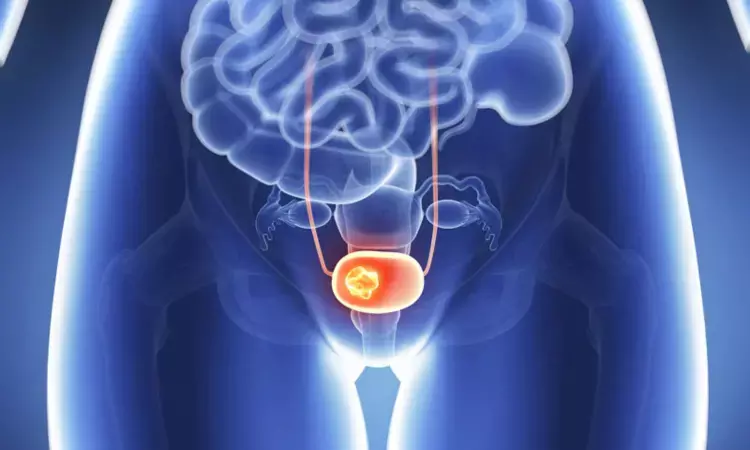- Home
- Medical news & Guidelines
- Anesthesiology
- Cardiology and CTVS
- Critical Care
- Dentistry
- Dermatology
- Diabetes and Endocrinology
- ENT
- Gastroenterology
- Medicine
- Nephrology
- Neurology
- Obstretics-Gynaecology
- Oncology
- Ophthalmology
- Orthopaedics
- Pediatrics-Neonatology
- Psychiatry
- Pulmonology
- Radiology
- Surgery
- Urology
- Laboratory Medicine
- Diet
- Nursing
- Paramedical
- Physiotherapy
- Health news
- Fact Check
- Bone Health Fact Check
- Brain Health Fact Check
- Cancer Related Fact Check
- Child Care Fact Check
- Dental and oral health fact check
- Diabetes and metabolic health fact check
- Diet and Nutrition Fact Check
- Eye and ENT Care Fact Check
- Fitness fact check
- Gut health fact check
- Heart health fact check
- Kidney health fact check
- Medical education fact check
- Men's health fact check
- Respiratory fact check
- Skin and hair care fact check
- Vaccine and Immunization fact check
- Women's health fact check
- AYUSH
- State News
- Andaman and Nicobar Islands
- Andhra Pradesh
- Arunachal Pradesh
- Assam
- Bihar
- Chandigarh
- Chattisgarh
- Dadra and Nagar Haveli
- Daman and Diu
- Delhi
- Goa
- Gujarat
- Haryana
- Himachal Pradesh
- Jammu & Kashmir
- Jharkhand
- Karnataka
- Kerala
- Ladakh
- Lakshadweep
- Madhya Pradesh
- Maharashtra
- Manipur
- Meghalaya
- Mizoram
- Nagaland
- Odisha
- Puducherry
- Punjab
- Rajasthan
- Sikkim
- Tamil Nadu
- Telangana
- Tripura
- Uttar Pradesh
- Uttrakhand
- West Bengal
- Medical Education
- Industry
Metabolic syndrome linked with elevated risk of bladder cancer

China: Metabolic syndrome (MetS) is associated with an elevated risk of bladder cancer in the general population, a recent study in Frontiers in Oncology has revealed. The results underscore the importance of individualized management of MetS components for preventing bladder cancer.
A metabolic syndrome is a group of metabolic abnormalities, including hypertension, central obesity, insulin resistance, dyslipidemia, and diabetes. The components of MetS have been shown as risk factors for various solid cancers. However, currently, there is limited epidemiological evidence on the relevance of MetS and the risk of bladder cancer.
Considering the above, Shuo Fang, Sun Yat-sen University, Shenzhen, China, and colleagues aimed to examine whether MetS factors, either individually or in the aggregate, are associated with the subsequent bladder cancer occurrence, and they also investigated the non-linear associations for individual MetS components in a prospective cohort study.
The study included 476,986 participants with undiagnosed bladder cancer based on the UK Biobank. The study defined metabolic syndrome as at least three of the five selected indicators: central obesity, hypertension, reduced HDL-cholesterol, raised triglyceride, and increased fasting plasma glucose. The researchers identified bladder cancer by contacting the British Cancer Registry for a median follow-up time of 6.6 years. Hazard ratio (HR) was assessed through Cox proportional hazard regression following lifestyle and demographic factors adjustment. The restricted cubic spline method examined non-linear associations for individual MetS components.
The study demonstrated the following findings:
· 487 cases of bladder cancer were ascertained during a follow-up of 3,112,566 person-years.
· MetS (HR = 1.32), central obesity (HR = 1.39), dyslipidemia for HDL cholesterol (HR = 1.31), and hyperglycemia (HR = 1.44) were associated with elevated risk of bladder cancer.
· Bladder cancer risk increased with the number of MetS components.
· In stratified analyses, MetS showed similar effects in bladder cancer independently with sex, age, cigarette and alcohol use, physical activity, and dietary factors.
· Higher waist circumference, BMI, fasting blood glucose, and glycosylated hemoglobin were independently associated with increased risk of bladder cancer, with no evidence against non-linearity.
"The findings suggest that metabolic syndrome might be an independent risk factor for bladder cancer in the general population," the researchers wrote in their study. "Dyslipidemia for HDL cholesterol, central obesity, and hyperglycemia were the three primary MetS components that might be independently associated with bladder cancer risk." They added that the primary associations are weak and may be affected by residual confounding.
The researchers felt the need for more extensive prospective studies to confirm the conclusion and examine the external validity of the findings.
Reference:
Fang S, Liu Y, Dai H, Gao T, Zeng L, Sun R, Zheng Z, Yuan J, Xia B, Pan Y. Association of metabolic syndrome and the risk of bladder cancer: A prospective cohort study. Front Oncol. 2022 Oct 3;12:996440. doi: 10.3389/fonc.2022.996440. PMID: 36263231; PMCID: PMC9574437.
Dr Kamal Kant Kohli-MBBS, DTCD- a chest specialist with more than 30 years of practice and a flair for writing clinical articles, Dr Kamal Kant Kohli joined Medical Dialogues as a Chief Editor of Medical News. Besides writing articles, as an editor, he proofreads and verifies all the medical content published on Medical Dialogues including those coming from journals, studies,medical conferences,guidelines etc. Email: drkohli@medicaldialogues.in. Contact no. 011-43720751


